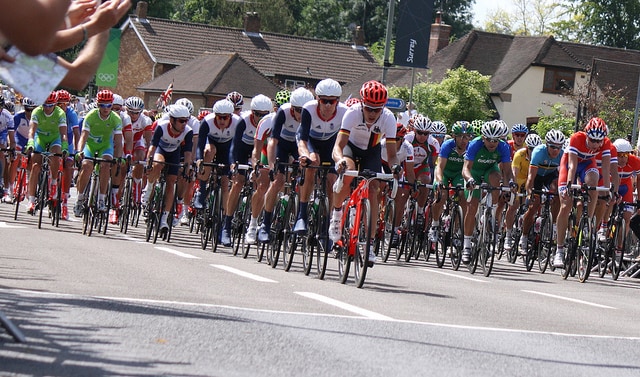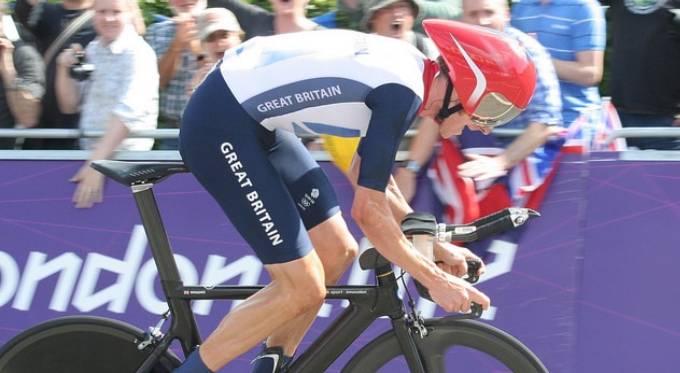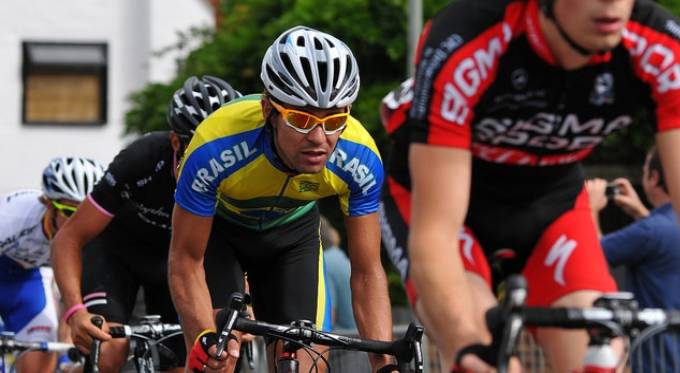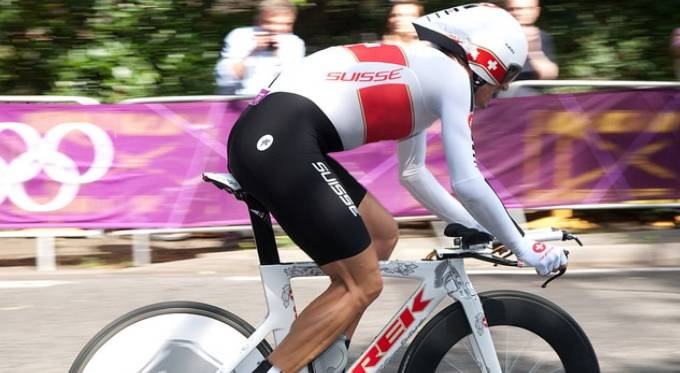Cycling is regarded as one of the most daredevil sports in the Olympics; riding carbon chariots that can accelerate at unthinkable speeds powered by immense lower body strength, and without much in the way of protection should you take a tumble. It all makes for a very dangerous sport.
When you watch road racing, you’ll notice the incredible speeds that the riders can reach and the complex manoeuvres they attempt to ride in each other’s slipstreams or simply position themselves to reduce a heavy crosswind.
 The sport is a fantastic example of teamwork and strategy. In cycling all-out power does not mean always winning the race, because the sport is about endurance and mustering up the strength when you need it the most. At the Stockholm Olympics in 1912, the longest ever cycling road race was held, stretching for a colossal 320km and lasting more than 10 hours.
The sport is a fantastic example of teamwork and strategy. In cycling all-out power does not mean always winning the race, because the sport is about endurance and mustering up the strength when you need it the most. At the Stockholm Olympics in 1912, the longest ever cycling road race was held, stretching for a colossal 320km and lasting more than 10 hours.
Key to succeeding in cycling is about having the right bike. In the Olympics there are both road and track disciplines, and the bikes do vary between the two forms. However, both styles are incredibly lightweight and built for speed, with every part made as aerodynamic as possible to glide seamlessly through the air. The riders even wear specially designed helmets that allow the cyclist to cut through the air in an attempt to conserve energy for those all-out sprints.
 Eating Like An Olympic Cyclist
Eating Like An Olympic CyclistDiet is one of the most important aspects when we talk about transforming an everyday person into an Olympian, and cyclists have a very interesting diet. Whilst they require a larger muscle mass to power those long rides and create incredible torque when required, they do need to stay light. Given that cycling usually involves trimming weight from every part of the bicycle, the same usually applies to the rider.
If you want Olympic success, you need to train hard and eat a balanced diet. Due to the training intensity, food is very important in keeping your body topped up and ready to go for the next time you hit the gym, the road, or the track.
 “Your protein source will ideally contain as many of the different amino acids as possible, and you als:o want fast absorption into your system. A source with a higher fat content like red or processed meat slows absorption. I recommend trying lean chicken, turkey, fish, soy, or eggs as your main sources – and keep them rotating, as much for the sake of your palate as your muscles.” – Sir Chris Hoy (Telegraph)
“Your protein source will ideally contain as many of the different amino acids as possible, and you als:o want fast absorption into your system. A source with a higher fat content like red or processed meat slows absorption. I recommend trying lean chicken, turkey, fish, soy, or eggs as your main sources – and keep them rotating, as much for the sake of your palate as your muscles.” – Sir Chris Hoy (Telegraph)
“An easy post-exercise meal is three scrambled eggs on two slices of white toast. This ticks all the boxes: high GI carbohydrate from the toast, lean protein from the eggs and some salt from the bread. If you’ve sweated a lot in training you could add a little extra salt to the eggs to help replace the electrolytes. Just don’t forget to drink water too!” – Sir Chris Hoy (Telegraph)
Eat lots of complex carbohydrates.
Drink a large amount of water to compensate for the long training sessions.
Salt is very important when carving up lots of miles on a bike.
One of the most time-intense sports that you can train for due to the long races is road cycling. This is mainly due to the incredible length of the races, which, based on the last years Paris Olympics can be around six hours, winner Remco Evenepoel won gold with a time of 6:19:34. Second place, taken by Valentin Madouas, finished a minute behind with a time of 6:20:45, which is why Olympians need to train so hard to gain increased performance out of nowhere in order to achieve a few extra seconds lead.
 But shall we talk about the training plan of one of the greatest Olympic cyclists ever? Chris Hoy has a long list of victories, holding a total of seven Olympic medals, with six golds and one silver. In cycling, competitors will often train for long periods of time to increase their endurance, whilst throwing the occasional power training set into the mix to build torque. The type of cycling discipline can also change the style of training because a 200m track sprint will involve more explosive power than a six-hour road race.
But shall we talk about the training plan of one of the greatest Olympic cyclists ever? Chris Hoy has a long list of victories, holding a total of seven Olympic medals, with six golds and one silver. In cycling, competitors will often train for long periods of time to increase their endurance, whilst throwing the occasional power training set into the mix to build torque. The type of cycling discipline can also change the style of training because a 200m track sprint will involve more explosive power than a six-hour road race.
“Time constraints often affect training, and it can be tough to make gains in the face of a busy work/life schedule. Intervals (which means alternating stints of high and low-intensity effort in one workout) help solve this problem and often produce breakthroughs when your training has felt stale for a while." – Chris Hoy (Belfast Telegraph)
“If you have a favourite climb, where there’s not a lot of traffic, try doing 30 seconds of effort followed by 30 seconds recovery. If you are at home on the turbo and listening to music, you can incorporate this by riding hard for one song, and easing off the next. Make sure you have warmed up properly first, and try to do around five efforts to start with, and just make sure the likes of Bohemian Rhapsody don’t get stuck on repeat.” – Chris Hoy (Belfast Telegraph)
Plenty of rest with a long cooldown after heavy training sessions.
Try to get out on the road instead of training on the bike.
Data is key to ensuring you can work on any particular area that needs improvement.
Hydration is essential due to the long periods of time your body is experiencing stress.
Core work is key to building up stability and the ability to climb faster.
It's clear that Olympic Cyclists put in a huge amount of dedication into the sport, and they are the ideal speakers for any event. So if you are looking for an Olympic Speaker – here are a few who you might want to attend your event:
Laura Kenny has acquired an incredible twenty-eight medals throughout her career, including five Olympic, seven World Championship, 14 European Championship and two commonwealth titles. She is both the most successful female cyclist and the most successful British female athlete in Olympic history. Laura will certainly make a fantastic Olympic Speaker for your event.
Chris Froome has worn more yellow jerseys than many professional cyclists, having won the gruelling Tour de France four times. The two time Olympic bronze medalist has also won the Giro d'Italia and twice won the Vuelta a España. Chris' ability to inspire others with his determination and focus on achieving excellence makes him an excellent choice for your next event.
If you are looking for an Olympic Great for your next event, look no further than Jason Kenny. The cyclist has won an incredible seven gold medals. He currently holds the record for the most OLympic golds and mst Olympic medals won by a cyclist. Without a doubt, Jason has the Olympics mindset of never backing down from a challenge.
Lizzie Armstead is an Olympic speaker and professional track and road racing cycling champion, she has too many wins to list simply in this quick summary, but her highlights include a silver at the 2012 Olympic Games and a gold medal during the Commonwealth Games in 2014, she also won the British National Road Race Championships four times.
Geraint Thomas is a distinguished Welsh cyclist who excels in both track and road racing. A multiple World Champion and Olympic gold medalist, he made history by winning the 2018 Tour de France. His resilience, diverse achievements, and wealth of experience make him an inspiring and engaging speaker.
Karen Drake, a standout Paralympic cyclist, triumphed with a Gold Medal in the 2016 Rio Paralympics' Women’s Road Time Trial, building on her Silver Medal from 2012. Her resilience and dedication make her an inspiring speaker, able to motivate others through personal experience, overcoming challenges, and achieving excellence.
Olympic cyclists put everything on the line to save seconds, pushing themselves through the long climbs and bracing for the steep declines. They can speak about a great variety of topics and have some incredible stories to tell.
There you have it, everything you need to know about becoming an Olympic athlete with a few of our favourite moments, quotes and most sought-after speakers thrown into the mix. In the lead up to the Rio Olympics we do hope you have enjoyed this article, and please stay tuned for more sports-related articles as well as the latest Olympic news.
Olympic cyclists push their bodies to the limit, powering through gruelling climbs and bracing for exhilarating descents - all in a relentless quest to save vital seconds. Beyond their impressive physical feats, these athletes have an abundance of captivating stories and insights to share from their journeys.
So, there you have it - everything you need to know about what it takes to become an Olympic athlete, along with some of our favourite moments, memorable quotes, and celebrated speakers. Stay tuned for more sports-related content and the latest Olympic news!
To book an Olympic Cyclist for your next corporate event or conference, simply contact the Champions Olympic Speakers agency via our online contact form. Alternatively, call a booking agent directly on 0207 1010 553 for more information.
To discuss the details of your event or book one of our exciting Olympic and Paralympic speakers, call a booking agent at Champions Olympic Speakers on 0207 1010 553 or complete our online contact form.

Position at the company
Lorem ipsum dolor sit amet, consectetur adipiscing elit, sed do eiusmod tempor incididunt ut labore et dolore magna aliqua. Eleifend donec pretium vulputate sapien nec sagittis aliquam. Fringilla ut morbi tincidunt augue. Nibh sit amet commodo nulla facilisi.